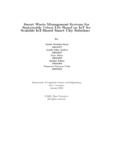Smart waste management systems for sustainable urban life based on IoT for scalable IoT-based smart city solutions
Abstract
In smart cities, the volume of data collected by IoT-based sensors is rapidly in creasing. These devices are networked and provide information about how humans
utilize them together and independently, as well as how they could be improved. Ev ery individual and business generates waste, but its disposal must be controlled to
prevent dangers to public health and the environment. In order to develop sustain able and habitable cities, efficient waste management systems must be implemented.
In this situation, recycling is an effective waste management strategy that can be
adopted. To ensure the effectiveness of a recycling program, cities and communities
must make waste management services easily available. Waste management entails
the collection, transportation, and disposal of sewage, rubbish, and other types of
waste. Some have postulated that a cognitive network of the fifth generation could
contribute greatly to the overall enhancement of IoT system functionality. Today,
solid waste is one of the most pressing issues on a global scale, as poor rubbish
disposal from villages, towns, and cities has a negative impact on the local popula tion and is the root cause of new diseases. Consequently, technologically-advanced
trash management is a pressing matter. In the existing traditional system, garbage
monitoring and disposal are performed by humans, which is cumbersome; thus, by
incorporating IoT into the traditional system, garbage bin monitoring will be simpli fied. In this study, we investigate the Internet of Things and propose an IoT-based
architecture for a Smart Waste Management System in a smart city. Our purpose
is to demonstrate how IoT may be utilized to handle and manage smart city waste
while accounting for scale and adaptability challenges. The suggested system em ploys ultrasonic sensors to detect the level of trash in the bin and communicate the
status of the waste to the bin. Using global system for mobile (GSM), the server
will notify the appropriate individuals (driver of garbage collection vehicle) via SMS
and GPS location. The driver will gather waste and update the server accordingly.
The proposed trash management system is vastly superior to the waste management
systems currently employed in its industry since it employs significantly less work ers to fulfill its goals, prevents rubbish spills, reduces processing times and costs,
and is entirely automated. Our suggested model can accurately track the status of
garbage containers with a 91% success rate, while waste disposal accuracy is 89%.
In addition, we investigate the vast array of potential technical applications in a
”smart city,” including ”smart houses,” ”smart buildings,” ”smart industries,” etc.

